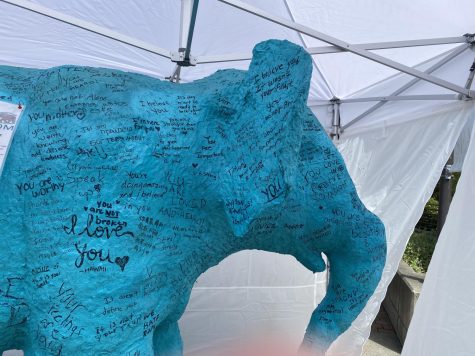Elephant in the room
University recognizes Sexual Assault Awareness Month
April 27, 2022

During the month of April, students who walk past Martin Square have been able to catch a glimpse of something unique to a college campus: a teal elephant.
The elephant has affirming messages written, such as “You are loved” and “You are not alone,” which speak toward victims of sexual assault.
The elephant was made by Office of Safety and Security employees out of plywood and paper mache in 2016, but this is the first time the elephant has been displayed since the COVID-19 pandemic began.
Special investigations officer, Christina Traverso, works in OSS and helps investigate cases of safety concerns on campus, which includes sexual violence.
“The purpose of the elephant is for people to write encouraging messages. If survivors were to approach the elephant, then they could see those positive messages to them. But they might not always want to talk about that and that’s ok too,” Traverso said. “It’s a way they can receive a lot of affirming and thoughtful messages because a lot of the time those kinds of messages are not always what they are receiving.”
Because some people may find the topic of sexual assault uncomfortable, OSS staff decided to make an elephant to raise awareness, as sexual assault is the “elephant in the room.”
Sophomore English literature and secondary education major Anna Kizziar believes that the conversation around sexual assault is one that needs more recognition.
“The display is very important and I think it should be talked about way more,” (NAME) said. “This should be a year long discussion, not just for sexual assault awareness month.”
There is an average of 293,066 victims of rape and sexual assault a year in the United States. One sexual assault happens every 107 seconds.
On April 6, Associate Director of Safety and Security Cheryl Michaels released an email to Seattle Pacific University students regarding Sexual Assault Awareness Month, listing the ways students can observe and participate throughout the month. Resources that OSS and the SPU Counseling Center provide were highlighted in the email, as well as specific days they recognize, one being Denim Day on April 27.
The email emphasized, “There is still no excuse and never an invitation to rape.”
Denim Day is a nationally recognized day that started over a supreme court decision in Italy in 1998, which involved an overturned rape conviction because the 18-year-old victim was wearing tight jeans. The 45-year-old rapist argued that the tight jeans implied consent. Outraged by the verdict, women who worked in the Italian Parliament wore jeans to work in protest.
“Wearing jeans or denim on Denim Day is our way of protesting that people cannot be raped because of what they wear,” Traverso said.
To add further awareness to Denim Day, OSS placed a bowl of round teal pins next to the teal elephant in Martin Square. Each pin says, “Ask me why I am wearing jeans today!”
Sexual assault can happen to anyone, but the rate it happens to college-age people is significantly high. According to the Association of American Universities, 13% of undergraduate and graduate student responses from 33 universities reported experiencing nonconsensual sexual contact since they enrolled at their university.
“We do get reports of sexual assault,” Traverso said. “College-age people are at a higher risk for sexual assault than other populations.”
Traverso also explained how OSS can provide resources to students who experienced sexual assault, even though some do not wish to make a formal complaint.
“Some people don’t want to formally report this, but they do want advice on how they can feel safe. So for people who do not want it to be a formal complaint, we can advise them,” Traverso said.
Junior communications major EJ Ibanga believes that displays like these are beneficial to the SPU community.
“The fact that the school is noticing that is going to be beneficial for people to be okay with asking other people for help and talking about it,” Ibanga said.
Sexual assault is not an easy subject to talk about, especially for people who have experienced it firsthand. But acknowledging the fact that it does happen can be a powerful step toward further awareness and change.
Ibanga praised the university’s efforts at sparking conversations around the topic of sexual assault.
“The school is taking its time and really diving deeper into getting to know the issues that are at hand for students, and I think it’s great that this conversation is starting and more people are talking about it because it’s a real issue,” Ibanga said.



























































































